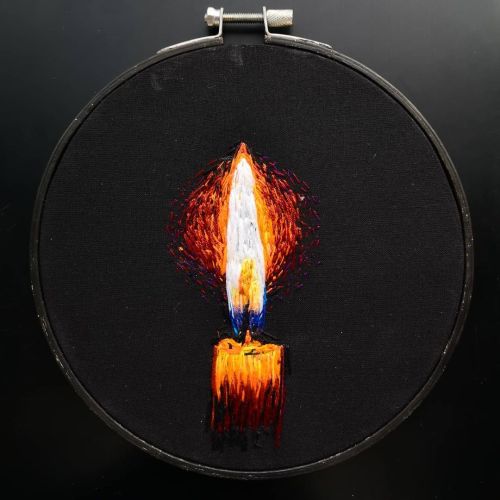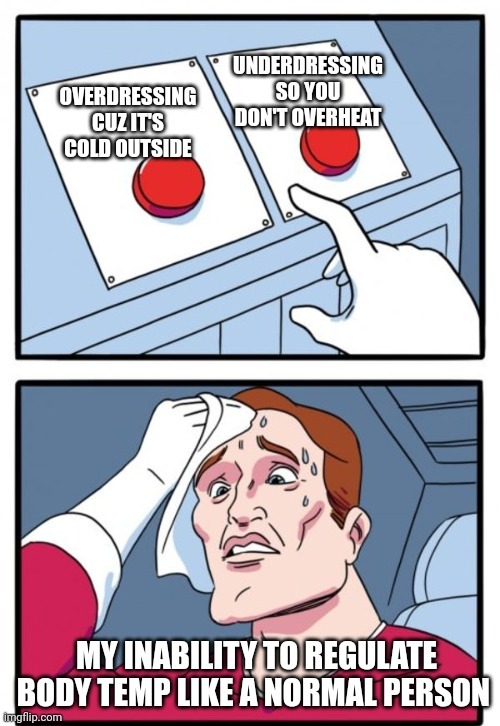Light In The Darkness By Chloe Amy Avery By Mtlgrems

Light In The Darkness by Chloe Amy Avery by mtlgrems
More Posts from Itsrorotime and Others
INFP: Today I parked my car on a street.
INFP: And I didn't pay for the parking.
INTP: Wow, I tremble with fear. INFP, you've become a criminal.
INFP: *horrified but secretly proud*

My nemesis: sweaty armpit stains on shirts 😤
What is dysautonomia
Definition:
Dysautonomia refers to a disorder of autonomic nervous system (ANS) function that generally involves failure of the sympathetic or parasympathetic components of the ANS, but dysautonomia involving excessive or overactive ANS actions also can occur.
Some symptoms include:
Abnormally fast or slow heart rate
Anxiety
Excessive sweating or not being able to sweat
Fatigue
Feeling short of breath (especially when you exercise)
Feeling thirsty all the time
Having trouble swallowing
Headaches
Insomnia
Nausea and diarrhea
Vision problems (blurred vision, vision loss, tunnel vision)
AND A LOT MORE
Dysautonomia affects:
Blood pressure.
Breathing.
Digestion.
Heart rate.
Kidney function.
Pupil dilation and constriction in the eyes.
Sexual function.
Body and skin temperature control
Examples of diseases in which secondary dysautonomia can occur include:
Diabetes.
Parkinson’s disease.
Muscular sclerosis.
Rheumatoid arthritis.
Lupus.
Sjogren's syndrome.
Sarcoidosis.
Crohn’s disease, ulcerative colitis.
Celiac disease.
Charcot-Marie-Tooth disease.
Chiari malformation.
Amyloidosis.
Guillain-Barre syndrome.
Ehlers-Danlos syndrome.
Lambert-Eaton syndrome.
Vitamin B and E deficiencies
Human immunodeficiency virus (HIV).
Lyme disease.
Different types:
Neurocardiogenic syncope (NCS): NCS is the most common form of dysautonomia. It can cause fainting spells that happen once or twice in your lifetime or multiple times every day. NCS is also called situational syncope or vasovagal syncope.
Postural orthostatic tachycardia syndrome (POTS): A disorder that causes problems with circulation (blood flow), POTS can cause your heart to beat too fast when you stand up. It can lead to fainting, chest pain and shortness of breath.
Familial dysautonomia (FD): People inherit this type of dysautonomia from their genetic relatives. It can cause decreased pain sensitivity, lack of eye tears and trouble regulating body temperature. FD is more likely to affect Jewish people (Ashkenazi Jewish heritage) of Eastern European heritage.
Multiple system atrophy (MSA): A life-threatening form of dysautonomia, multiple system atrophy develops in people over 40 years old. It can lead to heart rate issues, low blood pressure, erectile dysfunction and loss of bladder control.
Pure autonomic failure: People with this form of dysautonomia experience a fall in blood pressure upon standing and have symptoms including dizziness, fainting, visual problems, chest pain and tiredness. Symptoms are sometimes relieved by lying down or sitting.
Me: I’m having such a good time
Brain: sure would suck if you get hit with a low mood, and go nonverbal, and come off as rude and uninterested in your friends
Me:

hi i brought some memes based on fourth wing
















and i also created a playlist:
upd: i don't know what the problem is with the playlist showing, i'll try to fix it
Six: You’re always so calm, no matter what happens. How do you do it?
Nine: It’s easy. You just got to make yourself dead inside. Then it doesn’t matter what happens… good… bad… nothing gets through, so nothing bothers you. Easy.
AJRs entire discography is just them being like “growing up was the worst thing i ever did” with a bunch of horn instruments and i eat it up
Disorganized (aka fearful-avoidant) attachment style is overanalyzing/overcorrecting when you think your partner might be pulling away from you, but then pulling away from them when they draw close to you.
It is both craving AND fearing intimacy so deeply that you grip people tight in your hands lest they leave you, but keep them at an arms length lest they love you.


Why is your personality type dangerous? ⚠️ Join @sosyncd today to meet your perfect personality match 💚
-
 iamidentical liked this · 2 weeks ago
iamidentical liked this · 2 weeks ago -
 birdylion reblogged this · 2 weeks ago
birdylion reblogged this · 2 weeks ago -
 vari0us-artists liked this · 2 weeks ago
vari0us-artists liked this · 2 weeks ago -
 thatoneartist-inthecorner liked this · 2 weeks ago
thatoneartist-inthecorner liked this · 2 weeks ago -
 the-better-phoenix256 reblogged this · 2 weeks ago
the-better-phoenix256 reblogged this · 2 weeks ago -
 the-better-phoenix256 liked this · 2 weeks ago
the-better-phoenix256 liked this · 2 weeks ago -
 missfitz reblogged this · 3 weeks ago
missfitz reblogged this · 3 weeks ago -
 d-lishtastytheatre reblogged this · 3 weeks ago
d-lishtastytheatre reblogged this · 3 weeks ago -
 arty-ankylosaurus reblogged this · 3 weeks ago
arty-ankylosaurus reblogged this · 3 weeks ago -
 blogmyheartout reblogged this · 4 weeks ago
blogmyheartout reblogged this · 4 weeks ago -
 lvcifvr reblogged this · 1 month ago
lvcifvr reblogged this · 1 month ago -
 eclectichellmouth reblogged this · 1 month ago
eclectichellmouth reblogged this · 1 month ago -
 g-l-a-s-s-h-e-a-r-t-s-s liked this · 1 month ago
g-l-a-s-s-h-e-a-r-t-s-s liked this · 1 month ago -
 neptunekiid reblogged this · 1 month ago
neptunekiid reblogged this · 1 month ago -
 mourningwithmagicians reblogged this · 1 month ago
mourningwithmagicians reblogged this · 1 month ago -
 maggiedeshiboux liked this · 1 month ago
maggiedeshiboux liked this · 1 month ago -
 wandering-trolls reblogged this · 1 month ago
wandering-trolls reblogged this · 1 month ago -
 incognito-insomniac liked this · 1 month ago
incognito-insomniac liked this · 1 month ago -
 borderlinedennis liked this · 1 month ago
borderlinedennis liked this · 1 month ago -
 taciturntraveller reblogged this · 1 month ago
taciturntraveller reblogged this · 1 month ago -
 socially-awkward-skeleton reblogged this · 1 month ago
socially-awkward-skeleton reblogged this · 1 month ago -
 whitetiger94things reblogged this · 1 month ago
whitetiger94things reblogged this · 1 month ago -
 insomniaticnightmare reblogged this · 1 month ago
insomniaticnightmare reblogged this · 1 month ago -
 lionyacrowroar reblogged this · 1 month ago
lionyacrowroar reblogged this · 1 month ago -
 lvcifvr liked this · 1 month ago
lvcifvr liked this · 1 month ago -
 noah-makes-art reblogged this · 1 month ago
noah-makes-art reblogged this · 1 month ago -
 plazmaman reblogged this · 1 month ago
plazmaman reblogged this · 1 month ago -
 plazmaman liked this · 1 month ago
plazmaman liked this · 1 month ago -
 weremuttz reblogged this · 1 month ago
weremuttz reblogged this · 1 month ago -
 fleshisartificial liked this · 1 month ago
fleshisartificial liked this · 1 month ago -
 melioris reblogged this · 1 month ago
melioris reblogged this · 1 month ago -
 silverandsunflowers liked this · 1 month ago
silverandsunflowers liked this · 1 month ago -
 celestial--fawn reblogged this · 1 month ago
celestial--fawn reblogged this · 1 month ago -
 herowithoutacause reblogged this · 1 month ago
herowithoutacause reblogged this · 1 month ago -
 herowithoutacause liked this · 1 month ago
herowithoutacause liked this · 1 month ago -
 butimbroken liked this · 1 month ago
butimbroken liked this · 1 month ago -
 wigglingwilde liked this · 1 month ago
wigglingwilde liked this · 1 month ago -
 apocalypsepajamas reblogged this · 1 month ago
apocalypsepajamas reblogged this · 1 month ago -
 quinn-the-human reblogged this · 1 month ago
quinn-the-human reblogged this · 1 month ago -
 herebedragonsinplaid reblogged this · 1 month ago
herebedragonsinplaid reblogged this · 1 month ago -
 hollyevolving reblogged this · 1 month ago
hollyevolving reblogged this · 1 month ago -
 eccentricgoblin reblogged this · 1 month ago
eccentricgoblin reblogged this · 1 month ago -
 littleshitsofthefourthdimension liked this · 1 month ago
littleshitsofthefourthdimension liked this · 1 month ago -
 perri-berry reblogged this · 1 month ago
perri-berry reblogged this · 1 month ago -
 legendaryspacepunkengineer liked this · 1 month ago
legendaryspacepunkengineer liked this · 1 month ago -
 annaandelsaofarendelle reblogged this · 1 month ago
annaandelsaofarendelle reblogged this · 1 month ago -
 sehruncreative reblogged this · 1 month ago
sehruncreative reblogged this · 1 month ago -
 sammypeaches liked this · 1 month ago
sammypeaches liked this · 1 month ago -
 caterinafromsiberia liked this · 1 month ago
caterinafromsiberia liked this · 1 month ago
